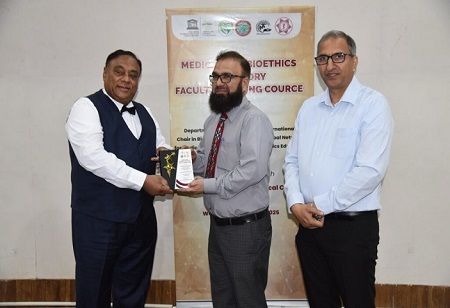The Jammu and Kashmir Medical Council has entered into a memorandum of understanding (MoU) with the Asia Pacific Division and the Department of Education International Chair in Bioethics (UNESCO Chair), which is a major move towards developing medical and bioethics education in the region. The partnership seeks to enhance collaborative efforts in medical ethics, health law, and bioethics by promoting teaching, training, curriculum development, and faculty and professional development for faculty, medical professionals, students, and alumni.
As a part of the agreement, the two sides will explore together possibilities of cooperation in the fields such as academic innovation, research, development of pedagogy and assessment methods, sharing of ideas and resources, and the incorporation of bioethics into Indian undergraduate and postgraduate medical education courses. The MoU also identifies joint attendance at seminars, workshops, conferences, and online courses, and the encouragement of module-based and case-based teaching methods.
After the MoU, the JK Medical Council in collaboration with the international network for medical, health professions, and bioethics education, Melbourne, Australia, conducted a one-day training program on April 16 at Government Medical College, Srinagar. The workshop, which was entitled "Medical Faculty Training Program in Ethics and Medical Education", convened a prestigious panel of national and international experts in the domain of bioethics.
The program was inaugurated with an opening speech by Prof. S. Muhammad Salim Khan, President of JK Medical Council, and the vote of thanks was given by Prof. Sandeep Dogra, Council Registrar.
Some of the key faculty members present at the workshop included Professor Russell Franco D'Souza, Dean and Professor of Organizational Psychological Medicine, International Institute of Organizational Psychological Medicine, Melbourne, Doncaster, and Melbourne, Florida. He is also Chair and Head of the Asia Pacific Division of the UNESCO Chair in Bioethics at the University of Haifa. Dr. Vedprakash Mishra, Secretary General of the International Council of the Global Network for Medical, Health Professions & Bioethics Education and President of the Association of Medical Educators of India (AMEI), also attended the program. He is presently leading the medical and health professions schools of the Indian Program of the UNESCO Chair and chairs the National Task Force on Medical Education set up by the National Academy of Medical Sciences, Government of India.
Dr. Mary Mathew, Secretary General of AMEI and Deputy Head of the Department of Education of the India Program of the International Chair in Bioethics, shared her knowledge with the session. She is also a Professor and Head of Department of Pathology, Kasturba Medical College, Manipal. Dr. Princy Louis Palatty, Departmental Head of Amrita Vishwapeeth Pharmacology and Indian Program of UNESCO Chair in Bioethics National Chair for Curriculum, was also one of the speakers. She is also South India Unit head of the Bioethics Chair.
The faculty roll also included Dr. Vivek Mady, an obstetrician-gynecologist who holds a history of consumer law, cyber forensic science, and bioethics, and Dr. Surapaneni Krishna Mohan, Vice Principal and Biochemistry Professor, Panimalar Medical College Hospital & Research Institute, Chennai. Dr. Mohan is Chair, Association for Medical Education in Europe – International Networking Centre (AMEE-INC) Bioethics Unit and is in charge of Clinical Skills and Simulation programs at the institute.
The workshop included targeted sessions on a broad array of topics, including the 3T Paradigm in Bioethics Education – learning the strategy to teach, train, and transfer bioethics to health professions; enriching learning through active learning techniques to improve participation and comprehension; multimodal assessment approaches for bioethics in health professions education; and the ethical frontiers of artificial intelligence in clinical training and research.
Members of the JK Medical Council such as Prof. Mehnaz Sultan and Prof. Asifa Nazir, who chair the committee on ethics and grievances and the CME and anti-quackery committee, respectively, participated in the one-day workshop. Faculty members of medical education units and institutional ethics committees from some medical colleges in Jammu and Kashmir also participated.

